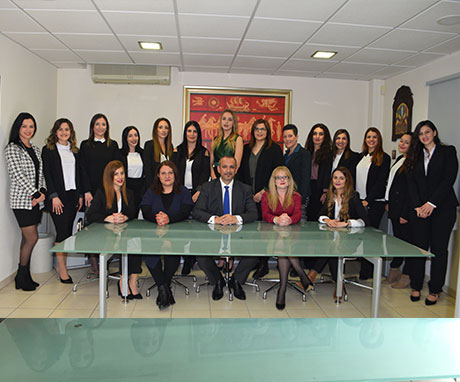Family Lawyer in Cyprus – When it comes to family matters, legal expertise is often required to ensure a fair and just resolution. A family lawyer plays a crucial role in helping individuals and families navigate through complex legal processes. In Cyprus, finding a reliable family lawyer is essential to protect your rights and interests. This article aims to provide a comprehensive overview of family lawyers in Cyprus, their importance, the services they offer, and how to find the right one for your specific needs.
Table of Contents
What is a Family Lawyer?
A family lawyer is a legal professional who specializes in handling legal matters related to family relationships. They are well-versed in family law, which encompasses various areas such as divorce, child custody, adoption, property division, alimony, and domestic violence cases. Family lawyers provide legal advice, represent clients in court proceedings, draft legal documents, and negotiate settlements on behalf of their clients.
Importance of a Family Lawyer
Family lawyers play a crucial role in protecting the rights and interests of individuals and families involved in legal disputes. They have in-depth knowledge of family law and are familiar with the legal processes involved in family-related cases. Whether it’s a divorce, child custody battle, or adoption process, a family lawyer provides expert guidance and ensures that the legal proceedings are conducted in a fair and just manner.
Services Provided by a Family Lawyer
Family lawyers in Cyprus offer a wide range of services to individuals and families in need of legal assistance. Some of the common services provided by family lawyers include:
Divorce and Separation: Family lawyers assist clients in filing for divorce, negotiating settlements, and handling legal issues related to the dissolution of marriage.
Child Custody and Visitation: In cases involving child custody disputes, family lawyers help their clients navigate the complex legal framework and strive for a favorable custody arrangement.
Adoption: Family lawyers guide individuals or couples through the adoption process, ensuring compliance with legal requirements and facilitating the legal transfer of parental rights.
Property Division: Family lawyers help clients resolve property division matters during divorce proceedings, ensuring a fair distribution of assets and liabilities.
Alimony and Spousal Support: Family lawyers assist clients in determining and negotiating alimony or spousal support payments in cases where one party requires financial assistance after separation or divorce.
Domestic Violence: Family lawyers provide legal support to victims of domestic violence, helping them obtain restraining orders and ensuring their safety and well-being.
How to Find a Family Lawyer
Finding a reliable family lawyer in Cyprus requires careful consideration. Here are some steps to help you find the right family lawyer for your specific needs:
Research and Gather Recommendations: Start by conducting thorough research online, looking for reputable law firms or individual lawyers specializing in family law. Seek recommendations from friends, family, or colleagues who may have previously worked with a family lawyer.
Check Credentials and Experience: Look for family lawyers who are licensed and have extensive experience in handling family law cases. Verify their credentials by checking their educational background, certifications, and professional memberships.
Read Client Reviews: Go through online reviews and testimonials from previous clients to get an idea of the lawyer’s reputation and their ability to deliver satisfactory results.
Schedule Initial Consultations: Contact a few potential family lawyers and schedule initial consultations. Use this opportunity to discuss your case, ask relevant questions, and evaluate their communication style, knowledge, and expertise.
Assess Compatibility: It’s essential to choose a family lawyer with whom you feel comfortable and confident. Assess their ability to listen, understand your concerns, and provide practical solutions tailored to your specific situation.
Consider Cost and Fee Structure: Discuss the lawyer’s fee structure, including consultation fees, retainer fees, and hourly rates. Ensure that you have a clear understanding of the costs involved before making a decision.
Questions to Ask a Family Lawyer
During your consultation with a family lawyer, consider asking the following questions to gauge their suitability for your case:
1. How many years of experience do you have in handling family law cases?
2. Have you handled cases similar to mine in the past? What were the outcomes?
3. What is your approach to resolving family law disputes? Are you open to negotiation and mediation?
4. How will you communicate with me throughout the process? Can I expect regular updates on my case?
5. What are the potential timelines and expected costs associated with my case?
6. Are there alternative dispute resolution methods you recommend, such as collaborative law or arbitration?
7. How do you ensure the protection of my rights and interests during the legal proceedings?
8. Will you be the primary lawyer handling my case, or will it be assigned to someone else within the firm?
Family Law Cases
Family law covers various types of cases that may require the expertise of a family lawyer. Some common family law cases include:
1. Divorce Cases
Divorce cases involve the legal dissolution of a marriage. A family lawyer assists in filing for divorce, negotiating property division, child custody, and support agreements, and representing clients in divorce-related court proceedings.
2. Child Custody Cases
Child custody cases arise when parents are unable to reach an agreement on custody and visitation arrangements for their children. Family lawyers help clients navigate the legal process and advocate for the best interests of the children involved.
3. Adoption Cases
Adoption cases involve the legal process of establishing a parent-child relationship between individuals or couples and a child who is not biologically related to them. Family lawyers guide clients through the adoption process, ensuring compliance with legal requirements and facilitating a smooth transition.
4. Property Division Cases
During divorce or separation, property division cases determine how assets and liabilities are distributed between the parties involved. Family lawyers assist in negotiating fair and equitable property division settlements or represent clients in court if an agreement cannot be reached.
5. Alimony and Spousal Support Cases
In cases where one spouse requires financial support after a divorce or separation, family lawyers help determine and negotiate alimony or spousal support payments. They consider factors such as income disparity, earning capacity, and the length of the marriage to arrive at a fair and reasonable support arrangement.
6. Domestic Violence Cases
Domestic violence cases involve physical, emotional, or financial abuse within a family or intimate relationship. Family lawyers play a crucial role in helping victims seek legal protection, obtain restraining orders, and navigate the legal process to ensure their safety and well-being.
In Cyprus, family lawyers play a vital role in ensuring fair and just outcomes for individuals and families involved in legal disputes. Their expertise in family law, combined with their ability to provide guidance, representation, and support, makes them indispensable in cases related to divorce, child custody, adoption, property division, and domestic violence. When seeking a family lawyer in Cyprus, it is important to conduct thorough research, check credentials and experience, read client reviews, and schedule initial consultations to assess compatibility. Asking relevant questions during the consultation helps in making an informed decision.
Family law encompasses a wide range of cases, including divorce, child custody, adoption, property division, alimony, and domestic violence. Each case requires specialized knowledge and expertise to navigate the legal complexities and protect the rights and interests of the parties involved.
In conclusion, when facing family-related legal matters in Cyprus, consulting and hiring a competent family lawyer is crucial. They provide invaluable support, guide clients through the legal processes, and strive for favorable outcomes. By following the steps outlined in this article, individuals and families can find the right family lawyer to represent them and ensure the best possible resolution for their case.
FAQs About Family Lawyer in Cyprus
1. How long does the process of hiring a family lawyer in Cyprus take?
The timeline for hiring a family lawyer varies depending on individual circumstances. It is recommended to start the research process well in advance to allow time for consultations, evaluating options, and making an informed decision.
2. What factors should I consider when choosing a family lawyer in Cyprus?
Some important factors to consider include experience in family law, specialization in relevant areas, reputation, communication style, fees, and compatibility with the lawyer.
3. Can I represent myself in family law cases in Cyprus?
While it is possible to represent yourself, it is generally advisable to seek legal representation, especially in complex family law cases. A knowledgeable family lawyer can provide expertise, protect your rights, and navigate the legal process effectively.
4. How much does it cost to hire a family lawyer in Cyprus?
The cost of hiring a family lawyer can vary depending on factors such as the complexity of the case, the lawyer’s experience, and the fee structure. It is important to discuss fees and payment terms with the lawyer during the initial consultation.
5. Can a family lawyer help with resolving disputes outside of court?
Yes, many family lawyers encourage alternative dispute resolution methods such as negotiation, mediation, or collaborative law to reach mutually satisfactory agreements outside of court. This approach can save time, money, and emotional stress.







